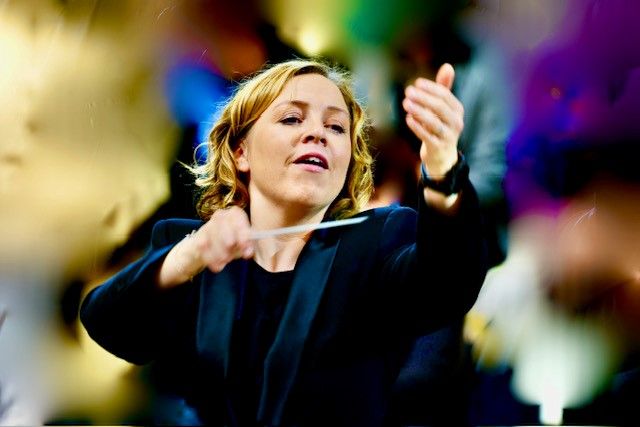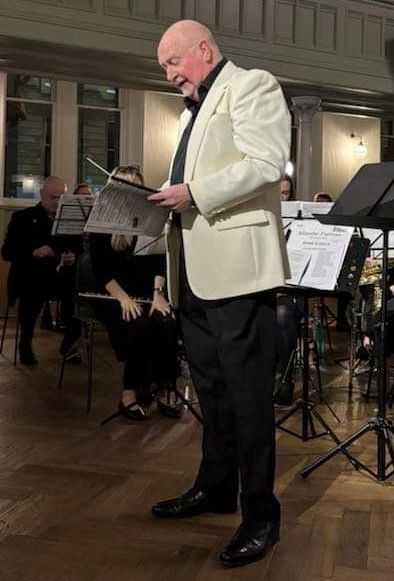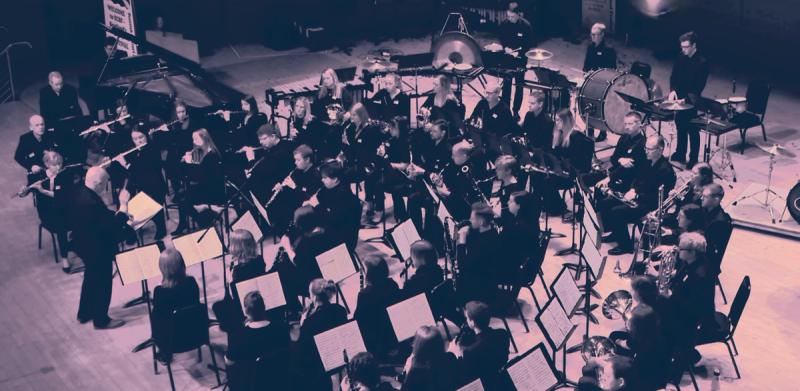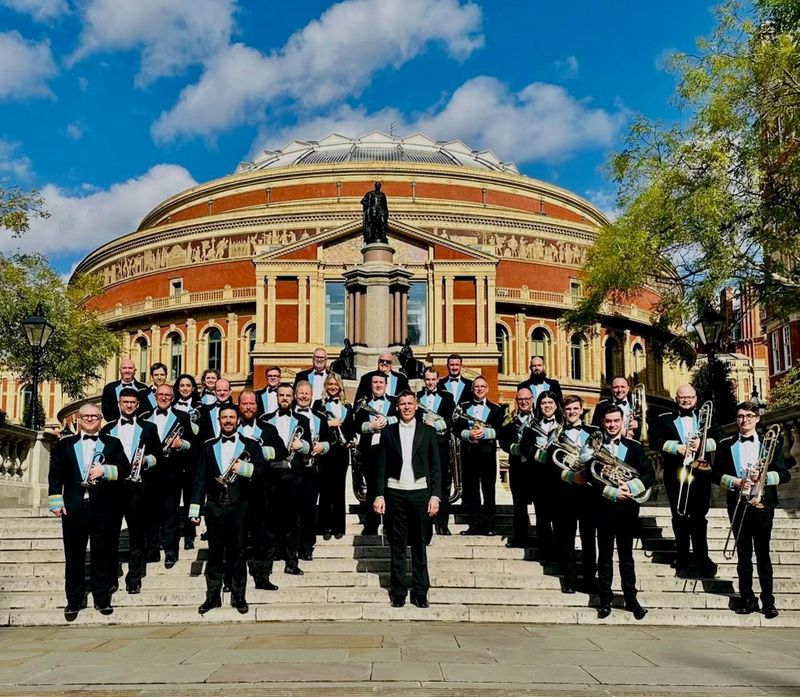/ Gaelforces: GWB and the Cooperation Band

— This event is in the past —
The Cooperation Band
The Yeti - At the
Foot of the Mountain
Magnus Brandseth
Mystery shrouds the mythical creature of the Yeti. This elusive character, apparently native to the Himalayan region of Nepal, Bhutan and Tibet, has been the subject of many expeditions throughout the years; yet concrete evidence of its existence has never been found.
Norwegian composer Brandseth transports the listener to the snow-capped mountains in Asia, as the music opens eerily, with mystique and awe in the alluring vibraphone solo. The horns cry out three times over the expansiveness, with echoes heard in the upper brass. The music builds to a rhythmic, pulsating bass riff, and the journey to find the Yeti begins. The seductive melodies echo the culture of the East, using a recognisable Klezmer scale, and creating a feeling of exoticism and mystery. The driving rhythms continue, until the horns present a new virtuosic idea with drama and intensity. The band joins again, and the excitement builds toward a final frenzy in this programmatic musical adventure.
Just As I Am
Wilfred Heaton
Published in 1947, but written years before (when Heaton was only 20 years old), this timeless composition is more than just a hymn setting. It comprises a miniature Tone Poem of real intensity from the Sheffield-born composer.
After a lonely and mournful opening statement from the cornets, followed by rich middle band, the tenor trombones firstly sing out the devotional hymn Just as I am in its original form. A melancholy feel returns, and a musical conversation is passed round the band with fluidity. Intensity and drama builds - there is even some uncertainty - but in Heaton’s mind, it is clear that hope and good will prevail. We hear the chorale return at the climax, allowing the cooperation band to display the warm, homogenous brass sound it is renowned for. Satisfied with his message, Heaton ends the setting peacefully and with humility, with three solo cornets holding a major triad, punctuated with the bass sounds. The sun sets, and we fade to peace.
Midnight
Lucy Pankhurst
Lucy Pankhurst is a trailblazer in British band composition and has the claim of being the first women recipient of a British Composer Award in the Brass/Wind category. Perhaps we should not be surprised of her ground-breaking character - she is in fact a distant relative of the famous suffragette, Emmeline Pankhurst.
Midnight for solo euphonium, brass and percussion is inspired by the ‘witching hour’, with its illustrated scenes of spell casting and conjuration. Pankhurst writes:
The piece begins at midnight itself - the night is still and cold as the 'sorcerer' (solo euphonium) makes his entrance and begins the spell, calmly and deliberately, setting the scene.
The music breaks into a 'Pagan Dance', the excitement and energy of which is a stark contrast to the still of the night - it breaks the silence and calls to the spirits. The dance gradually becomes more disjointed, with the melody echoed in layers above a cacophony of percussion as the soloist breaks away from the band. The ensemble leads into the next section with a furious crescendo, leaving the melody unfinished and 'floating' in mid-air.
The sorcerer enters a trance-like state, in which the soloist performs a cadenza over an aleatoric ensemble and ‘bubbling’ trombones. Here we see the sorcerer completing the final acts of the spell. The band gradually begin to sing, one by one, until the entire band sound is taken over by the vocalisations. This is indicative of the transformation, as well as the evocation of the spirits and energies which the sorcerer is summoning. As the 'chanting' reaches its climax, the spell bursts into an explosion, leaving the night as calm and silent as it was before.
The sorcerer is nowhere to be seen . ..
Into the Darkness They Go,
the Wise and the Lovely
Kelly-Marie Murphy
Kelly-Marie Murphy is a formidable and renowned composer in the Canadian classical music scene. She has created works for all of her home nation’s symphony orchestras - Toronto, Winnipeg and, latterly, Vancouver, where she worked closely with British conductor Bramwell Tovey, before he died suddenly in 2022.
It was upon Tovey’s passing that Murphy felt inspired to write this short, contemplative work for brass band. When attempting to write this music, she asked how she could even begin to pay tribute to such an important person in her life and career. Murphy found a hint in a poem by Edna St Vincent Millay called Dirge Without Music, from which the rather unusual title originates.
Like the poem, Murphy’s music contains relatable emotions that many of us have experienced upon losing someone we love. There is sadness of course; but you can also hear moments of denial, frustration, anger, screaming out in pain, and asking simply ‘why?'. In grief, the emotional journey is not linear - there are also moments of calm and contemplation, as well as a sense of moving on, as the percussion help create the feel of a procession or cortège. As the music builds, rising scales chase one another to the top, and there is a huge climax of raw emotion. After this unrestrained release, we finally have a feeling of acceptance. We hear a simple, warm finish, where darkness is defied by light.
Four Scottish Dances
Malcolm Arnold arr. Ray Farr
Sir Malcolm Arnold has been referred to as ‘one of the most traditional of modern English composers’. He wrote extensively for symphony orchestra and his score for Bridge Over the River Kwai earned him an Oscar. He also loved the bracing sound of the brass band and wrote for the medium with great skill - his Little Suites being examples of such pieces which existed originally in the brass band, before being arranged for orchestra and wind band. However his series of national dances are possibly his most treasured works. As well as his Cornish Dances and English Dances, Malcolm chose to evoke Scotland with his 1957 work, Four Scottish Dances, with reels, Scottish snap rhythms and instruments imitating bagpipe drones.
Each of the four movements is inspired by Scottish country folk tunes and dances. We have a Strathspey to open, shown by its disciplined and stately Scottish snaps, as well as the drones from the pipes throughout. The second movement, labelled Vivace, is a lively reel dance - listen out for the ‘tipsy’ middle section played by bass trombone in Ray Farr’s clever arrangement. The beautiful third movement echoes a lullaby or highland lament, before we conclude with a boisterous and high-octane highland fling.
[ INTERVAL 15 MINUTES ]
Glasgow Wind Band
Danzas Cubanas
Robert Sheldon
Glasgow Wind Band opens the second half of this performance with Danzas Cubanas (first performed in 2010) This set of three original dance–like movements celebrates the joy and energy of Afro-Cuban music and the people of the island nation. The opening conga sets the mood, followed by a gentle son-salsa and the closing dance is a fast-paced and energetic mambo.
Tam o’Shanter
Malcolm Arnold arranged by John Paynter
Tam o’Shanter (not to be confused with the Scottish woolen cap!) is the title and hero of a poem by the Scottish poet, Robert Burns (1759-1796).He is a drunken farmer who, whilst riding home late from Ayr on a stormy night, disturbs a witch’s party in the haunted church of Alloway. The hags pursue him to the keystone of the bridge over the river Doon, but have to halt there as they can’t cross running water. One witch however, manages to plucks the tail from his mare, Maggie.
The poem concludes with the following admonition:
“Now, wha’ this tale o’ truth shall read,
Ilk man, and mother’s son, take heed.
Whene’er to drink you are inclin’d,
Or cutty-sarks run in your mind,
Think, ye may buy the joys o’er dear,
Remember Tam o’Shanter’s mare.”
October
Eric Whitacre
“October is my favourite month. Something about the crisp autumn air and the subtle change in light always makes me a little sentimental, and as I started to sketch October I felt that same quiet beauty in the writing. The simple, pastoral melodies and subsequent harmonies are inspired by the great English Romantics (Vaughan Williams, Elgar) as I felt that this style was also perfectly suited to capture the natural and pastoral soul of the season.” October was premiered on May 14th, 2000.
Eric Whitacre
Spirit of Andalusia
Philip Sparke
Spirit of Andalusia was commissioned by the Glasgow Wind Band in 2015 and was self-funded by members of the band and special events. The premier performance was at the NCBF Regional Festival on 1st November 2015.
“The brief was for an arresting 5-minute opener, but during the compositional process the piece seemed to take a Spanish feel.I decided to follow this involuntary lead, and thereby produced a salute to the exciting rhythms and colours of Spain’s wonderful musical heritage, particularly the flamenco, whose heartland is the autonomous region of Andalusia.
Spirit of Andalusia starts with a dissonant, rhythmic fanfare before a series of short melodic snatches vie for attention and the fanfare re-asserts itself. After a short silence, a sinuous melody appears on flute and soprano saxophone and this develops until the whole band takes it up. A second joyful melody brightens the mood until a climax is reached and the music subsides to introduce a flamboyant solo for clarinet. A central slower nocturne, opening on soprano saxophone, once again builds to a full-band climax, followed by a clarinet cadenza. The original flamenco music returns in different orchestrations and builds to a crashing close.
Philip Sparke
Glasgow Wind Band &
The Cooperation Band
Crown Imperial March
William Walton
Crown Imperial was originally composed for the coronation of King Edward VIII, however Edward abdicated his throne and the march was instead performed at the coronation of King George VI on May 12, 1937 instead. It was also chosen to be performed at the coronation of Queen Elizabeth II in 1953 and as the recessional piece in the wedding of Prince William and Catherine Middleton in 2011.
The title for this work had been taken from the poem In Honour of the City of London by William Dunbar (1465-1520), and the quotation "In beawtie berying the Crone Imperial," was quoted by Walton at the head of his original score.
The music begins with a syncopated, energetic melody, which then grows into a proud and vibrant tune which recurs throughout the work. Interspersing lyrical sections taken at a more relaxed tempo, to be played in a grandiose and stately manner. The robust melodic themes conveys a sense of nationalistic pride.
The enormous strength and sense of tonality of this brilliant coronation march come from the Tudor choral style which Walton knew well. The first section has a quietly rhythmic opening which gradually builds to a splendid climax. A broad and stately melody, typically English in its majestic sonority, then provides the contrast to the first section, and the two themes are repeated towards the finale.
By combining both bands for tonight’s performance, we hope to add to the grandeur of tonight’s penultimate piece.
Gaelforce
Peter Graham
Gaelforce was originally composed for The Royal Norwegian Navy Band under the directorship of the late Nigel Boddice. Upon completion, Peter Graham decided to make a version for brass band as well. Katrina and I felt that this gave us a golden opportunity to combine the two bands by combining the two versions.
Irish folk music has undergone something of a renaissance in recent times, with high profile shows including Riverdance and Lord of the Dance being successfully adapted for a variety of media. Gaelforce follows in this tradition, and using three traditional folk tunes exploits the colour and variety of our two bands. Firstly, the slip jig, The Rocky Road to Dublin, features the woodwind section of the wind band. The Minstrel Boy then features the sweet melancholic tones of the flugel horn with brass band accompaniment.
Finally we combine the two bands for a tour de force rendition of Tossing the Feathers.
Katrina Marzella

Katrina Marzella-Wheeler was born in Edinburgh, Scotland in 1983 and is well-established in the brass music world as an instrumentalist, conductor and teacher. Katrina was the solo baritone horn player of the world famous Black Dyke Band from 2011 to 2020.
She won the inaugural BBC Radio 2 Young Brass Soloist of the Year in 2004, as well as the British Open Solo Championships in 2006 and 2007, and the Ern Keller International Soloist Award in 2007 and 2008. She was runner-up at the 5th European Soloist Competition in Linz in 2010 and was awarded the ‘Best Soloist’ award at the 2014 European Brass Band Championships in Perth.
Katrina is passionate about raising the profile of her chosen instrument, the baritone horn, and has premiered over 25 new solo works for her instrument with piano, brass bands, wind bands and orchestra. Katrina was integral to the development of the Yamaha Neo baritone horn and performs exclusively as a Yamaha Artist on the instrument she helped design.
For many years, Katrina practised as a lawyer in Manchester, England. After returning from a two year post with her young family in Naples, Italy, Katrina is in increasing demand as a conductor across mainland Europe. In recent years, she has been the guest conductor of Eikanger Bjørksvik Mussiklag (NO), Festival Brass Band (BE), Regensburg Brass Band (DE), Aldbourne Band (UK), the cooperation band (UK) and is currently the conductor of Kingdom Brass (UK).
Kevin Price

Kevin Price has been musical director of Glasgow Wind Band for over 30 years and has been instrumental in creating one of the leading symphonic wind orchestras in the country.
Born in Bristol in 1954, Kevin studied the trumpet at the Guildhall School of Music in London. His tutors were the late Bernard Brown (Royal Opera House, Covent Garden) and Howard Snell (London Symphony Orchestra). Whilst at Guildhall he won the coveted Brass Prize and a scholarship in Advanced Orchestral training.
Kevin’s subsequent freelance work while based in London included the Bournemouth Symphony Orchestra, Welsh Opera and various West End Shows. In 1980 he was appointed Principal Trumpet of Scottish Opera by Sir Alexander Gibson, a post he relinquished some eight years later to broaden his musical career.
For many years after leaving Scottish Opera, Kevin has been the principal guest trumpeter with the Royal Scottish National Orchestra under the batons of Stephane Deneuve, Neemi Järvi, Simon Rattle, Alexander Lazarev, Walter Weller and Sir Alexander Gibson amongst others. He has also played with all the major musical organisations in Scotland including the BBC Symphony Orchestra, the Scottish Chamber Orchestra and Scottish Ballet.
His involvement in chamber music has included work with the Paragon Ensemble, Brass Ecosse, BBC Scottish Brass Ensemble, Scottish Chamber Orchestra Brass Ensemble and the RSNO Brass Ensemble. Forays into the solo repertoire have included concertos with the Washington Ensemble and Scottish Opera Orchestra including obbligato trumpet with Dame Kiri te Kanawa.
Kevin’s recording experiences in Scotland have mainly been with the Royal Scottish National Orchestra but have also included BBC Scottish Television and Radio, STV, Scottish Opera, the Paragon Ensemble, BBC Scottish Symphony Orchestra and the Glasgow Philharmonic Orchestra.
Since 1988 he has expanded his teaching and conducting commitments, has acted as a lecturer for SAME, as a frequent external examiner for the RCS and as an adjudicator for the Scottish Concert Band Festival. His conducting experiences have included the Musical Directorships of the National Youth Orchestra of Scotland Wind Band and Brass Ensemble, the WOSIS Concert Band, the Dunbartonshire Wind Ensemble, the Strathclyde Arts Centre Wind Band, the Renfrewshire Senior Concert Band, East Renfrewshire Senior Concert Band and Junior Symphony Orchestra, North Ayrshire Senior Concert Band, the National Youth Wind Ensemble, the Scottish Borders Wind and Chamber Orchestras, the Kelvin Ensemble and, of course, the UK and Scottish Open Section Champions, the Glasgow Wind Band.

Glasgow Wind Band
Clarinets
Ann Cameron
Calum Mooney
Karen Gillespie
Claire Hinchliffe
Katrina Walker
Andrew Russell
Oona Tanner
E flat Clarinet
Linzi Cowan
Bass clarinets
Will Peveler
Anna Stephens
Piccolo
Graeme Smith
Flutes
Linda Bryce
Anya Galloway
Nick Joint
Nicola Maynes (+ Piccolo)
Karen McKay
Oboes
Archie Morton (+ Cor Anglais)
Charmaine Murdoch
Bassoons
Ashley Brandon
Jennifer Kelly
Alto Saxophones
John Paul Berrie
Kirsty Gordon
Karen Mackie
Lorraine Melone
Tenor Saxophone
Gordon Paton
Baritone Saxophone
Ian Alexander
French Horns
Julian Gonzales
Claire Griffiths
Gabi Rodriguez
Pauline Sim
Gemma Swan
Trumpets
Colin Forbes
Calum Kerr
Oliver Searle
Jack Walker
Trombones
Gavin Bryce
Hazel Douglas
Bass Trombone
Ronnie Paton
Euphonium
Anna Bassett
Tubas
Martin Thomson
Bob Whitney
Percussion
Lauren Jackson
Caroline Masson
Eilidh Nevin
Paula O’Malley
Stuart Ryan

The Cooperative Band
Soprano
Gordon Kyle
Solo Cornets
Jim Hayes
Ewan Miller
Mike Munro
Ray Munday
Daniel de Gruchy-Lambert
Repiano Cornet
Alex Ramsay
2nd Cornets
Keith Johnstone
Leigh Price
3rd Cornets
Scott Walker
Chris Keane
Flugelhorn
Stephanie Kennedy
Solo Horn
Chris Hamilton
1st Horn
Matt Fuller
2nd Horn
Iain Chisholm
Solo Euphonium
Chris Flynn
2nd Euphonium
Angus Ritchie
1st Baritone
Carole Ednie
2nd Baritone
Alan Douglas
Solo trombone
Ross Bahlaj
2nd trombone
Gerry Hennan
Bass trombone
Andy Foden
Eb Basses
Kenny Brown
Dean Logan
Bb Basses
Garry Kelly
Andy Smith
Percussion
Paula O'Malley
Derek Love
Stuart Ryan
Christmas with The Cooperation Band
Friday 13th December 2024
St Philomena's Church, 1255 Royston Road, G33 4EH
The Cooperation Band Christmas Songbook
Monday 16th December 2024
Zetland Parish Church, Grangemouth, FK3 9JH
Glasgow Wind Band Christmas Concert
Monday 16th December 2024
Govan & Linthouse Parish Church
| Date | |
|---|---|
| Time | – |
| Venue | Govan & Linthouse Parish Church, 796 Govan Rd, Govan, Glasgow G51 2YL |
| Performers | Glasgow Wind Band, The Cooperation Band |
